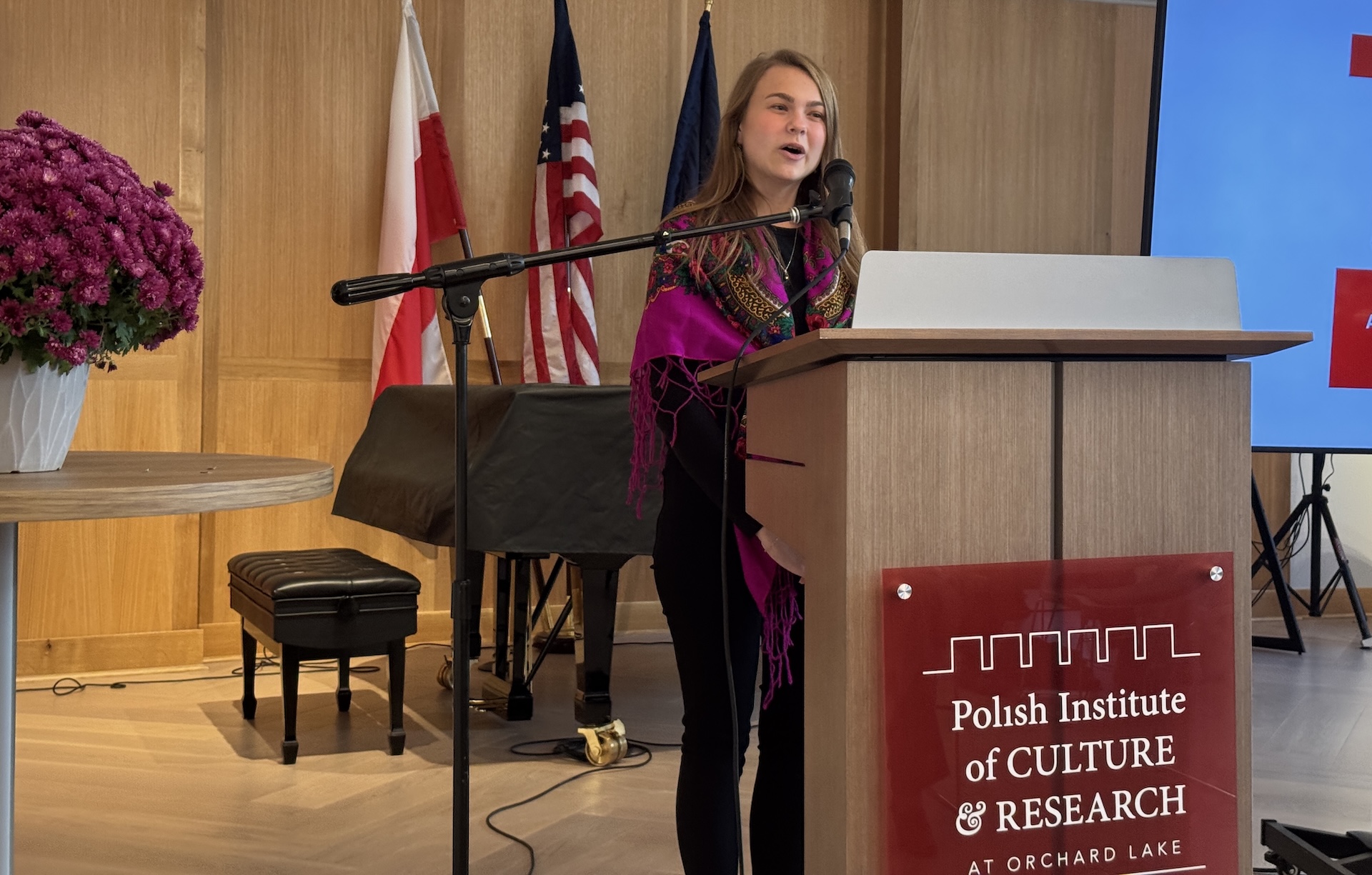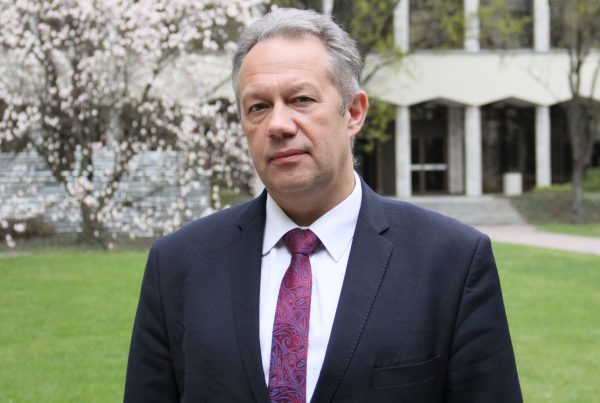This cycle of poems won the First Prize in the 2025 FPA Estelle Wachtel-Torres, MD Literary Competition.
By Sasha Gilders
Part 1 – Son of Many Worlds (1895-1918)
Torn Child
On the 15th of November, I entered this world,
as a child on two sides of a single line.
My soul was baptized twice:
once in a fountain of holy water,
once with the ink of a Hebrew printing press.
I remember the clicks of the typewriter
as my grandfather edited the Ha-Tsefirah.
I remember his words, his love of science,
all in Hebrew despite their hatred.
I remember the church bells
ringing from the top of St. Anne’s.
I remember my mother, her prayers,
evenings dedicated to Jesus.
I remember being in too many places.
I remember being everywhere.
I remember belonging nowhere.
I’m glad I remember,
because these memories
are the reason I’m here today.
Marszałkowska’s Winter Tram
It’s cramped in here.
All of the passengers wear heavy clothes.
We stand together to shelter from the cold,
but somehow it feels like we’re not together
as some hold newspapers in Polish,
but others in Yiddish. Or Russian:
the language of the announcements we hear.
It can’t be taken for granted.
Not long ago we rode in carriages
which were only as fast as our lazy horses.
Now we progress, we move faster,
and faster, and faster, and faster
and we can’t seem to stop ourselves.
Through the frost I see snow,
grey, from the soot, it blocks my view
like my childhood gaze.
I missed the people
who couldn’t meet the eyes of soldiers.
I realize now how much had passed
while the tram kept moving.
The First Poem I Didn’t Tear Up
I sit in the lamplight holding these papers
that usually would feel rough in my hands.
But today, they feel smooth, almost too perfect
and I realize I have it here: The Golden Horn.
For the first time, I’ve reached perfection.
For the first time, I keep the paper.
For the first time, I have a voice.
Part 2 – Between Cabaret and Conscience (1918-1939)
Letter From Paris
Dear Warsaw,
I’m afraid you cannot compete
with this art, these colors,
which are free to explode,
unlike yours, which are grey.
I miss your cafes
and the feelings of home,
the clicking and ringing,
the horns on the trams.
I don’t miss the rigid lines of the winters
which are filled with suspicion,
or the clutter in the streets:
soldiers, who hold us back.
But I suppose I will return
because there is no real
escape.
Headlines for Tomorrow’s Paper
“Government Announces New Freedom: Citizens May Now Choose What Hand to Salute With”
because the reality is that we writers know
that this is a time of oppression
and the real freedom is found in knowing
there is no freedom to be found.
but no…
“New Police Regulation: All Citizens Must Walk Straight to Avoid Revolutionary Curve”
because the reality is that we writers know
that they plan to control our every move
and the real freedom is found in doing
the small things we can do to protest.
but no…
“Marshall Smiles Upon Poland: We Smile Back Without Teeth”
because the reality is that we writers know
that these happy headlines we write are false
and the real freedom could be found in sharing
the true words we wish to speak.
but no…
“Marshall Smiles Upon Poland: We Smile Back”
List of Charges
Antoni Słonimski, we, the people of Poland, find you guilty of the following charges:
- Using too many foreign words in a pure Polish sentence.
- Walking in public without wearing the government-approved frown.
- Believing that ugly places, like Paris, are worth visiting.
- Associating with painters, actors, and others of questionable morals.
- Satirizing public officials without their proper permission.
- Refusing to smile at the government price lists.
- Harming our youth with the overuse of commas.
- Drinking coffee in a way that suggests sympathy with the Cosmopolitan agenda.
- Owning a pen longer than the government recommended length.
You are sentenced to be Public Enemy Number One.
…and I will wear the title as a badge of honor, knowing I’m a true friend of Poland.
Part 3 – War of Exile (1939-1945)
September Skies
The blue sky is beginning to change
revealing the oranges and reds,
the colors of leaves falling to the ground.
It’s hard to believe that these beautiful colors
come from a change that stems from death
as we prepare for a harsh winter.
I seek shelter from the storm
as the little black flakes fall
from the sky above.
You will not find that shelter here.
Not from the oranges of the explosions
or the reds of the blood on the street
or the flakes of ash cluttering the air,
making it hard for me to breathe.
You will not find shelter in the west
where the Germans rush in.
You will not find shelter in the east,
only the soldiers of the Soviet Union.
Here you will only find surrender.
Port of Marseille
I do not want to leave my home,
but I cannot be of use in this place.
There is no space here
for someone like me
so I am forced into exile.
In the colors of Paris I can be free,
or as free as I could hope to be.
In the words of Paris I can share
my rebellion with those who are here.
We who run can stand tall together
as artists, musicians, and poets.
At this moment, a dog can bring death.
A missing stamp could be the end.
A prayer may be a mistake.
But I make it through
to bring a new story
to bring people together
to a small cafe
and a new day.
Letter to a City Which No Longer Exists
Dear Warsaw,
There’s not much point in writing
to a pile of bricks and dust, stained red,
or to the smell of wet ash and charred wood,
or to the sight of bodies, lifeless in the streets,
or to the only sound left:
silence.
Part 4 – Return and Reckoning (1945-1976)
My First Steps Back
One foot.
Then another.
and another.
and another.
It feels the same each time
but different than before.
The buildings are coming back,
but they reek of socialism
and ignore our tradition.
I recall the days of riding the trams
instead of watching the military vehicles.
Their war may be over
but a new one has begun.
A Man Crosses the Street in Silence
I see their eyes
staring at me
through a hazy rain.
They watch me
subtly, for anything:
an act of resistance.
Their ears listen
for a single word
as my thoughts race.
But here I am silent
so later I won’t be
invisible.
Letter of 34
We were quiet as we wrote,
careful not to make a sound
as our pens brushed against the page
and we signed our names.
We were quiet then
because we wish to be loud.
They want to push our papers
back into our small hands
with their massive machines.
We are loud now
as we force our voices
into the ears of Cyrankiewicz
and we will not be ignored.
Maybe they’ll watch us.
Maybe they’ll hurt us.
Maybe they’ll kill us.
But we 34 stand together
as one Poland
for the hope of all.
Part 5 – Late Night Reflections
The Young Poet in My Study
I look at the boy whom I mentor
and wonder what he could do
if there was nobody here to him,
no government to censor his words.
He is young and light
with energy in each word.
I must teach him to hide the colors
within the mix of these greys.
Because I am older now, and wiser,
I know these special secrets.
I know how to be seen while invisible.
I teach not because I want him to hide
but because I want him to run
headfirst into a bright new future.
The Metronome of Warsaw
I can hear the clicking of the tempo.
The monotonous transport schedules,
our strict government curfews,
and the police patrols.
Many don’t notice,
they listen to the song
and take in its beauty
but we who write
cannot ignore the ticking
of Warsaw’s metronome
that keeps us in line.
The clock towers are alive.
They click in time
with our state’s routine
as they chime.
People line the streets.
They walk along in time,
keeping the rhythm with their feet.
But I stand here.
Hesitant.
Breaking the rhythm with my silence.
The Poet as Witness
Even though I am now dead
I still am very much alive.
The clicks of the typewriters
and the pages of ink
contain my hope, my voice, my legacy.
Without poetry, we have nothing.
We lose the wars and exiles,
the triumphs, the oppression.
But because my poems live,
we have witnessed this testimony.
These writings are our past.
They are our present.
They are our future.









